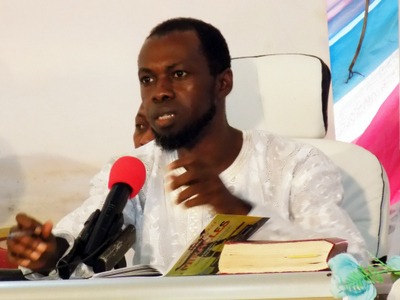Christians are Free Servants
By Elder Enoch Ofori Jnr
(Sabbath Sermon, 19th May, 2012)
Free but Not Free
From the word go, it’s a contradiction in terms; an oxymoron. How on earth could servants be said to be free? But that’s exactly what believers are.
We are free, but not free. Two scriptures eloquently state this truth:
Gal 5:13
For you were called to freedom, brothers. Only do not use your freedom as an opportunity for the flesh, but through love serve one another (ESV).
1Pe 2:16
Live as people who are free, not using your freedom as a cover-up for evil, but living as servants of God (ESV).
So, we are free in one respect but not free in another.
As believers, we are free from sin, free from the flesh, free from unrighteousness, and free from Satan.
But we owe a duty to the Spirit: “… brethren, we are debtors, not to the flesh, to live after the flesh” (Rom. 8:12). In other words, we are duty-bound to do the things of the Spirit and to carry out His will. Therefore, we are not free from righteousness, nor free from holiness, nor from prayer and fasting, nor the spiritual law of God and nor the Lordship of Jesus Christ.
But it’s not a slavish bondage but the voluntary performance of a deeply felt obligation because we are in love! We are in love with God and everything He represents–His truth, His law, His grace, His will, His Kingdom, His holiness, His righteousness, His power and His salvation. As a people who love God, we must fulfill the obligations of our love for Him as proof!
But what held us back in the past?
Jesus sets us Free Indeed
Before the believer was made free in Christ, he was in bondage “sold under sin” in his state of carnality and therefore was unable to keep the spiritual law of God (Rom. 7:14, 8:7). But this unfortunate situation has since changed with the coming of Christ. He has brought freedom to the believer. This freedom is found in His truth which is Word:
“So Jesus said to the Jews who had believed in Him, “If you abide in My word, you are truly My disciples,
“and you will know the truth, and the truth will set you free.”
“They answered Him, “We are offspring of Abraham and have never been enslaved to anyone. How is it that you say, ‘You will become free’?”
“Jesus answered them, “Truly, truly, I say to you, everyone who commits sin is a slave to sin.
“The slave does not remain in the house forever; the son remains forever.
“So if the Son sets you free, you will be free indeed.
“I know that you are offspring of Abraham; yet you seek to kill Me because My Word finds no place in you” (John 8:31-37 ESV).
He set forth the Word first, and that Word is the Truth, the knowledge of which makes people free. But the audience couldn’t catch the spiritual import of the statement. The idea of the truth making people free had evoked the wrong images of men and women physically bound in fetters and slaving for their Master under the harshest conditions imaginable. If they could not speak for others, at least they could pride themselves on their pedigree; they were the great Abraham’s physical descendants, the friend of God.
But Jesus meant every word of what He said. They were slaves in need of freedom irrespective of the circumstances of their birth if they committed sin, since “everyone who commits sin is a slave to sin”. And the inevitable consequence of being a slave to sin is that “the slave does not remain in the house [of the Father God] forever; [but] the son remains forever”. So freedom from sin is a promotion–from servanthood to sonship. But that kind of freedom is impossible for any human to achieve on his/her own; the greater Son from heaven is the only One able to set sinners free, which is the true freedom all humanity need. Not political freedom, not economic freedom, not even personal freedom. The loss of those freedoms is a mere outgrowth of the most fundamental freedom lost by man–the freedom to be what God created us to be! But the Son makes us free only if His Word, being His truth, has a place in us. Otherwise, we will take pride in our blue-blooded ancestry all we want, but we will still do what is sinful and dishonourable (such as murder ).
So, does the Word has a place in your heart? Or rather, do you have a room in your heart for the Word? The word translated “place” is ‘choreo’ (#5562) in the Greek and means (a) “to leave space (which may be filled or occupied by another), to make room, give place, yield … (b) to have space or room for receiving or holding something (Thayer’s Greek Definitions, e-Sword).
It’s not a restrictive space, or just a dumping place, but a room emptied and specially prepared to receive or hold the Word. The word tells us in Col. 3:16: “Let the word of Christ dwell in you richly in all wisdom; teaching and admonishing one another in psalms and hymns and spiritual songs, singing with grace in your hearts to the Lord”. In Jer. 15:16, the prophet exclaimed joyfully: “Thy words were found, and I did eat them; and Thy word was unto me the joy and rejoicing of mine heart: for I am called by Thy name, O LORD God of hosts”.
The Word must be of first importance in your life. You must love it, cherish it and obey it. Christ has invested His Word with power to set you free from sin.
From Servants of Sin to Servants of Righteousness
The effect of believers’ freedom from sin is that we have been set free by Christ so we can freely love God through obedience to His commandments. This is where, although we serve, a noticeable difference emerges with the serving done by a slave. We serve, not because we are under compulsion to do so, but because we love God. We read in 1 John 5:3: “For this is the love of God, that we keep His commandments, and His commandments are not burdensome”.
This is the point man began with God–in the Garden of Eden. He made us to reflect His righteous and holy character (Gen. 1:26), to be embodiments of His will. That objective has not changed; it’s a key goal of the Gospel: “And that ye put on the new man, which after God is created in righteousness and true holiness” (Eph. 4:24; Col. 3:10). The end result is eternal life:
“Know ye not, that to whom ye yield yourselves servants to obey, his servants ye are to whom ye obey; whether of sin unto death, or of obedience unto righteousness?
“But God be thanked, that ye were the servants of sin, but ye have obeyed from the heart that form of doctrine which was delivered you.
“Being then made free from sin, ye became the servants of righteousness.
“I speak after the manner of men because of the infirmity of your flesh: for as ye have yielded your members servants to uncleanness and to iniquity unto iniquity; even so now yield your members servants to righteousness unto holiness.
“For when ye were the servants of sin, ye were free from righteousness.
“What fruit had ye then in those things whereof ye are now ashamed? for the end of those things is death.
“But now being made free from sin, and become servants to God, ye have your fruit unto holiness, and the end everlasting life.
“For the wages of sin is death; but the gift of God is eternal life through Jesus Christ our Lord” (Rom. 6:16-23).
It’s common knowledge that no man can satisfactorily serve two strong personalities, much less a slave torn between two masters. But it’s even truer in the spiritual realm. No man can serve God and Satan nor righteousness and sin. He must yield to one: either he obeys sin and dies or he obeys God and becomes righteous. But thank God for the power of the Word—which is not just any teaching passed off as the word of God but the unadulterated sound doctrine. It is sincere obedience to this Word–the true teachings of Christ entrusted to the apostles for all generations of Christians—that releases us from the bondage of sin so that we “become the servants of righteousness” (vv. 17-18). This means that any teaching that does not conform to “the wholesome words of our Lord Jesus Christ” (1 Tim. 6:3) actually has the opposite effect (I Tim. 6: 4-5) of enmeshing people in greater corruption and therefore deepening their woes as servants of sin (2 Pet. 2:14-22).
However, the true doctrine of Christ does effect a change of status which can best be understood in terms of a normal human situation where a person exchanges his usual role for the opposite role. Thus whereas we spent our earlier life in serving uncleanness which promoted lawlessness leading to more lawlessness, we now surrender and devote our body parts to doing righteousness leading to holiness. This is a positive affirmation that when we were servants of sins, we were not obliged to do righteousness (vv. 19-20). And what was the consequence of the sinful things we did as servants of sin–things we now shrink from as righteous believers? The cold outcome was death (v. 21).
But life, eternal life–the exact opposite of death–is the outcome of the life of holiness which comes from being made free from sin, a state which makes us servants of God (v. 22). However, understand that eternal life does not come about as simply a matter of cause and effect for doing righteousness. It’s “the gift of God through Jesus Christ” who set us free in the first place (v. 23).
As a matter of fact, no man can on his own earn or create for himself eternal life; it comes from God and His Son alone (John 5:26; 1 John 5:11-12). But He grants it to those who have His image of righteousness and holiness, having been made servants of righteousness by Christ. It was in this condition that Adam and Eve had the gift of eternal life from God; it’s the state to which Christ is restoring us by making us free from sin.
In all history, I have not heard of any servant given such a priceless and matchless gift as “the gift of eternal life” as his master’s way of saying ‘well done’! But that’s exactly the gift God has reserved for all His servants who serve Him as servants of righteousness. It’s an ex gratia you will find nowhere else (1 Cor. 2:9).
So, let’s continue to do what will please God our Master, and He will bless us out of His own good pleasure:
“But the man who looks intently into the perfect law that gives freedom, and continues to do this, not forgetting what he has heard, but doing it—he will be blessed in what he does” (Jam. 1:25 NIV).
This is your calling as a servant of righteousness. Look intently into God’s perfect law of freedom and persevere in doing it, and He will bless you with “the gift of eternal life through Jesus Christ our Lord”. Amen!



